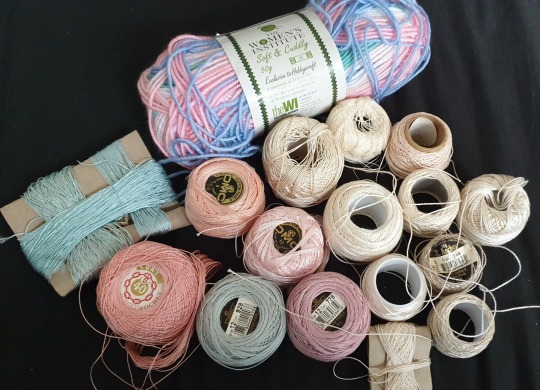#i'm british i know how to queue || queued
Explore tagged Tumblr posts
Text

I got a bunch of thread and some yarn from the old women at my crafting group.
#stash#yarn stash#thread stash#crafter#crafting#trans crafter#crafts#my content#needlework#craftblr#crochet thread#knitter#crocheter#cross stitcher#queer crafts#cross stitch#i'm british i know how to queue || queued
49 notes
·
View notes
Note
Hi— can you tell me what queue means? I saw your comment “cue the queue” and I see lots of people saying phrases with queue in it but I don’t understand.
hiiiiii!! okay so when i think of a queue i firstly think of a line. that's how the british use it, and that's basically what i think of when i think of it. you're waiting for your turn to be able to check out or talk to the service desk, and you're standing in line, otherwise known as a queue.
that's basically where the concept of a queue comes from when you think of digital things like when you're listening to music on spotify and don't want to get out of your playlist but want to add a song that isn't on the playlist into the play cycle, you can add that song to the queue or in netflix when you're adding movies that you want to have in a separate little area for you to remember to watch later, you add them to the queue as well. it's maybe not an actual physical line, but more like the list of what is coming up or what you'd like to have waiting for you.
the queue on tumblr is the same kind of thing. a lot of us utilize the queue feature because they are posts that you like and enjoy and want to reblog, but doesn't necessarily need to be reblogged right away (does anything really actually need to be reblogged right away? very few things do. anyway...). there are a lot of reasons people might use the queue feature. i know some people are only able to get on tumblr for an hour or two every day but want their blog to remain active even when they aren't there, so they fill their queue and have it post during the hours they know they can't be online, and others might have their own reasons to use a queue, but for me, i usually use it for a few different reasons.
the first is because i don't want to completely spam people with like 200 posts in 20 or 30 minutes and then just be completely gone for the rest of the day or even more than that. i still spam people when i'm online lololol but not nearly as bad as it would be if i wasn't constantly adding posts to my queue to post later lol
another reason is that i can't be on regularly, so i do like my blog staying active even if i'm not online. it feels like less pressure for me to be on and keeping up with everything for some reason, even though there's literally no pressure? i dunno. i like feeling present even if i'm not able to actually be there if that makes sense.
another reason though, and one i'm becoming more and more passionate about as time goes on and the culture of fandom continues to shift, is that i get frustrated with the speed with which things seem to come and go, content wise. if i am not able to be online during a louis show or harry or niall or whatever or in the immediate hours that follow, i feel like there's little to no chance of me seeing any content from that show unless i actually go to update accounts and seek out that content myself and i don't... do well with remembering what the update accounts are since i don't really follow them closely lmao i like coming across the content on my dash because people are still basking in it hours, days, weeks, YEARS later. so when the content starts coming out for the shows and i'm able to be online, i only actually reblog maybe half of what i'm seeing and i try to queue the rest so that they will still come up later. try to slow down the content a little bit and help it still be seen beyond those first few hours, show there's still a desire to have that content out there even if the gifs aren't posted immediately or whatever.
TAKE YOUR TIME MAKING THE CONTENT FOR WHATEVER SHOW OR VIDEO OR WHATEVER YOU CHOOSE TO MAKE. I PROMISE I WANT IT AND IF I SEE IT I WILL REBLOG WHENEVER IT GOES UP. or i'll queue it. if you see me liking a post of yours and it isn't immediately reblogged, it's okay. it WILL BE. i've liked it to show myself later it's okay, i have either previously reblogged it or i have queued it so i know i will have it on my blog in an attempt to not have too many repeats. lol which still happens cause my memory is horrible. but yeah.
so anyway. that's what a queue is. and a lot of us use silly tags for our queue that is usually a play on words or sounds or whatever. mine is cue the queue because i like homophones (words that are spelled differently but said the same way) and so i use that. but yeah, unfortunately the tag is only added if i'm on desktop, it doesn't automatically add when i'm on mobile which is annoying and therefore only maybe 1/3 of the time do the posts that are posting from my queue have that tag, but it's okay. i do try. (those of us that tag for our queues use a tag so that people can see the blog is active but they can know that while the posts are there, we aren't actually online. that way people don't think we're like purposefully ignoring them or something if they reach out and we don't immediately respond)
and there you have it! i hope this is thorough enough in what a queue is, why it exists, and what the tags might mean so everything you keep seeing people mentioning or talking about makes sense for you :D
#asks#Anonymous#i get a lot of questions about what a queue is#i should maybe tag these responses so i can easily link them to the times i've blathered on about it before#rather than creating a new one every time#somethign to consider perhaps#about queue#hahaha another fun pun hehe
3 notes
·
View notes
Text
The British Basics™
There are certain unspoken rules that are expected of the general public in the UK. Many of these rules are deemed as stereotypical—and you'll see more of them in our later blogs—but they make up an important part of our cultural identity. Just as there may be certain well known do’s and don’ts in the community you are from, Britain (and the University of Warwick, in turn), have them too. You'll see that these examples are a mix of manners and etiquette, though after all the talk from the post above, I'm sure you'll be sick of being polite soon enough.
So, here’s a lovely little list of some British basics in politeness:
Saying please and thank you: Using the words ‘please’ and ‘thank you’ are considered a universal expectation of all people here, especially when you are interacting with someone who is providing you a service; even though they are obligated to serve you, anyone taking on the role of a ‘servicer’ still has the right to being treated politely and with respect (page 36-37). Here are a few common examples: * Bus-drivers: Saying thank you to the bus driver as you get off the bus is a common and polite thing to do. You might hear some passengers call out 'cheers drive!' depending on which region of Britain you're in at the time, but it's best not to replicate this. People may think of your repetition (especially if you try to put on a British accent) as mockery, and you might be faced with some anger or confusion! * Ordering food/drink: it is polite and customary to start your order with “Please could I have…” or “May I have […], please?” and to thank the server once your food/drink is delivered. Even though it's their job, it's always nice to treat others with kindness, especially since they're also serving plenty of other people other than you! Minding your Ps and Qs here can go a long way. * People who open doors for you: These people are doing a service for you even though they’re not really obligated! And if you are in the position of being a door-opener, it’s always nice to be thanked for doing something for others, so try and do the same for those who do it for you! Just try not to spend all your time opening doors for people, most of all if you're in a rush to get to class yourself! Opening the door for the person behind you is polite enough, and the politeness carries over.
Queuing: Queuing is the British’s most obvious example of informal social order (page 1180). It’s how we keep our public spaces organised and to make sure everyone gets their turn when shopping, waiting for the bus, lining up for an appointment, waiting to enter a classroom, and many more scenarios! As such, the “rules of the waiting line” and waiting your turn is an honoured system that lots of British people take quite seriously. Line jumping or queue hopping (ignoring the queue and walking to the front or a part of the queue that is already established) is frowned upon by the British population, so try not to do it if you can (page 1182)! If you're saving a spot for your friend, that's different (just so long as you aren't cutting into the line to THEN save a spot for your friend in the queue) as you are still holding a space in the queue and maintaining the rules of waiting your turn, so don't worry too much. But if you're queueing for food in the Library Café, or lining up to pay for your lunch at Rootes, be prepared to be standing there a WHILE...
Oversharing: “How are you?” is a question that is typically used as a greeting (page 218) rather than a genuine check-in on someone’s well being. When asked “how are you?” or “you alright?” by someone, it’s appropriate to reply with something along the lines of “I’m good, thank you” or “I’m okay, how are you?” in order to continue the conversation. In British culture, it's customary not to share too much of your personal life with people you do not know well; talks about personal state (especially negative personal state) are reserved for friends, family, or people you consider close. When you get to know people a bit better, you can start being a little more honest about how you actually feel. When you’re conversing with strangers, though, (to save you from weird looks) avoid complaining about your landlord, your course, your lecturers, your classmates… you get the gist. Don't fret, though! This post gives you some helpful tips on conversation starts, if you're stuck.
Saying sorry: Sorry that I didn’t mention this earlier! British people are stereotypically known for saying sorry for everything, but the word ‘sorry’ can mean much more than just an apology! In this post, we expand on the word ‘sorry’ and how it is used in many ways in British culture. It’s a little confusing at first, but with practice, you’ll get the hang of it.
Punctuality: Generally, it is considered polite and respectful to arrive at an event on time (and in most cases, a few minutes early). Some people even hold the belief that ‘if you’re on time, you’re late!’. British people value their time and don’t like having to wait, and this carries over to lectures, seminars, meetings and other social events. In this post, we talk a bit more on what is expected of you at university if you’re late to an event, or know you won’t be able to attend it.
It’s a good idea to keep these in mind during your study time at Warwick, otherwise you may get some angry glares or disapproving looks! There isn’t anything ‘wrong’ with the way in which you know how to be polite and follow etiquette, it just may be the case that cultural values and norms here in Britain differ from the ones you may be accustomed to. If all else fails and you are still unsure about what to do on campus, asking friends, other students or staff to clarify for you is totally okay and usually helps to clear up any confusion.
Now go forth, in a timely manner, and be sorry, orderly and reserved about your personal life! (only half joking, there)
0 notes
Text
@chelystitch you'll love this
my favorite handspun ever
for my curious spinners—this is an art bat with colorful silk scraps spun thin, plied with a slightly thick and thin blush pink single for the barber pole effect~
338 notes
·
View notes
Text

17 September 2022

The queue of people patiently waiting to pay their respects to the Queen as she lies in state in Westminster Hall has become a talking point around the world.
The people populating its five-mile length are willing to shuffle slowly along for between nine and 24 hours, sometimes overnight.
The fact that it all works is down to a team of crowd science experts and a professor from Cumbria.
It has become known, simply, as The Queue.
Those watching its calm progress towards our former monarch - and it makes for strangely compulsive viewing - marvel at both its length and the stoic patience of those in it.
It is idiosyncratically British, they say.
Who else would willingly join a queue that lasts longer than the average working day?
And it comes with its own ecosystem. There is a live online queue tracker, coloured wristbands, toilets.
That it works is down to, among others, Prof Keith Still, from Burton-in-Kendal, Cumbria, who has been teaching and advising on crowd science for 30 years.
Planning for something like The Queue takes "decades", he says.

He has provided analysis and advice and reviewed plans for not only The Queue, but also the Queen's journey from Balmoral through Aberdeen, where he was born.
Asked if he ever anticipated The Queue could reach five miles long, he replies, swiftly: "Yes."
The Queen was so loved and reigned for so long, it was clear to him she was bound to have more people wanting to pay their respects than the 200,000 who gathered for the Queen Mother.
"You always plan for what might arrive and then five times that, and 10 times that," he says.

The Queue is remarkable for mostly being good humoured. There have been few reports of queue jumping or problems.
As Prof Still puts it: "The crowd itself is looking after people within it."
While this may be due to the sombre occasion, human nature and the psychology of queuing behaviour must also be considered, he says.
People need to know what is happening in advance to have their expectations set, and to be kept constantly informed and updated. In The Queue, they have had that.
Perceived fairness is also important, with VIP lanes visually separate, so it does not appear someone has just turned up and walked straight through.
"So long as people know what's happening, what's expected of them, how long it's going to take, they no longer face the uncertainty," he says. "And it keeps the crowd very much on your side."

People are happy if they know what is happening, even if the update is to say the update is coming.
"It's as soon as that information flow stops that you get a degree of uncertainty and people start behaving as individuals rather than as a collective," he says.
The Queue's temporary closure on Friday afternoon briefly concerned him. People were already on their way to join the end.
"When they announced that the queue had stopped, I thought 'you're just going to create another queue of people waiting to join the queue'," he says.
But this was "already in the contingency plan" and the closure was quickly reconsidered and The Queue extended out beyond Bermondsey.
The longer the queue, the more facilities you need to provide. As well as information, the crowd needs toilets, food, drinks, shelter and medical care.
"Eight hours might be acceptable for most people but 10, 12 - where's the limit of human endurance when standing for that length of time? These are all factored in," Prof Still says.

He does not think he could have stood for that length of time himself, not with arthritic hips.
"At 63, I can walk my dog for about 4km and that's it, I'm knackered for the rest of the day," he says.
But he trusts The Queue and has faith in the handful of his Masters students from Manchester Metropolitan University who took over from him in the team managing its planning.
These things are "always a significant team effort", he says.
"It's never just one person."
0 notes
Text
@chelystitch if only we lived close I'd be able to make this for you
Strawberry Season
If you've seen my adorable strawberry sweater design floating around knitblr and you've wanted to try it out, now is the time to grab a copy of the pattern!

Until the end of July, my fruit sweaters pattern is $8 instead of $10 (it's three patterns in one!)

188 notes
·
View notes
Text
Ooo I wanna make a flag quilt from my random fabrics, wonder if I have enough that would go together to do this...hmm...time to raid my stash o3o

First stripe is all cut out! The pride progress quilt is starting to take shape
351 notes
·
View notes